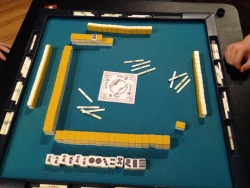Tenhou and chiihou: Difference between revisions
Pimanrules (talk | contribs) (I decided to "be bold" so to speak and add some of my own original research (which agrees with a source I found). I think it adds to the article to see the simulated probabilities, but feel free to move/remove it if you feel it's not appropriate.) |
No edit summary |
||
| Line 12: | Line 12: | ||
* [http://tenhou.net/0/?log=2014031008gm-0029-0000-95234e4a&tw=2&ts=4 Sitting north] | * [http://tenhou.net/0/?log=2014031008gm-0029-0000-95234e4a&tw=2&ts=4 Sitting north] | ||
}} | }} | ||
'''Tenhou''' {{kana|天和}} is a [[List of yaku#Yakuman|yakuman]] | '''Tenhou''' {{kana|天和}} is a [[List of yaku#Yakuman|yakuman]] obtained by the dealer completing the hand on the first tile draw. In other words, the hand wins before the first tile discard. Any combination of 14 tiles that can win can score tenhou. Declaring [[kan]] (or [[kita]] in [[sanma]]) will invalidate the yakuman. | ||
'''Chiihou''' {{kana|地和}} | '''Chiihou''' {{kana|地和}} is similar to tenhou, except it is won by non-dealers. In addition, any [[naki|tile call]] made by other players will invalidate chiihou. By definition, both yakuman can only win by tsumo; [[ron]] is not allowed. | ||
==Formation== | ==Formation== | ||
Tenhou and chiihou are entirely dependent on luck. The player only needs to recognize a complete hand and declare it. Failure to do so may result in a lost opportunity to score this rare yakuman. | |||
One pitfall is to declare [[riichi]], not recognizing that you had a winning hand.<ref>http://www.osamuko.com/delicious-riichi-button-must-click-it/</ref> This is likely due to the temptation of calling [[double riichi]] before verifying the completeness of the hand. This puts the hand into [[furiten]] immediately for calling riichi on a winning tile. Therefore, it is necessary to check the hand before making such a dubious riichi call. | |||
==Value== | |||
Tenhou applies to dealer seats only, so therefore, it is always 48,000 points unless combined with [[Multiple_yakuman|another yakuman]]. Likewise, chiihou applies to non-dealers valued at 32,000 points. Both must be won via [[tsumo]]. | |||
== | |||
== | ==Renhou== | ||
{{Main|Renhou]] | |||
An [[optional yaku]] is '''renhou'''. If a player wins before their first draw, and before any calls, then this yaku(man) is scored. Depending on rule variation, it may score as a [[mangan]] (or other value), not a yakuman. | |||
==Probability== | ==Probability== | ||
Revision as of 21:13, 19 March 2024
| Type | Yakuman |
|---|---|
| Kanji |
天和 地和 |
| English |
Heavenly hand Earthly hand |
| Value | Yakuman |
| Speed | Instant |
| Difficulty | Luck |
Tenhou 「天和」 is a yakuman obtained by the dealer completing the hand on the first tile draw. In other words, the hand wins before the first tile discard. Any combination of 14 tiles that can win can score tenhou. Declaring kan (or kita in sanma) will invalidate the yakuman.
Chiihou 「地和」 is similar to tenhou, except it is won by non-dealers. In addition, any tile call made by other players will invalidate chiihou. By definition, both yakuman can only win by tsumo; ron is not allowed.
Formation
Tenhou and chiihou are entirely dependent on luck. The player only needs to recognize a complete hand and declare it. Failure to do so may result in a lost opportunity to score this rare yakuman.
One pitfall is to declare riichi, not recognizing that you had a winning hand.[1] This is likely due to the temptation of calling double riichi before verifying the completeness of the hand. This puts the hand into furiten immediately for calling riichi on a winning tile. Therefore, it is necessary to check the hand before making such a dubious riichi call.
Value
Tenhou applies to dealer seats only, so therefore, it is always 48,000 points unless combined with another yakuman. Likewise, chiihou applies to non-dealers valued at 32,000 points. Both must be won via tsumo.
Renhou
{{Main|Renhou]] An optional yaku is renhou. If a player wins before their first draw, and before any calls, then this yaku(man) is scored. Depending on rule variation, it may score as a mangan (or other value), not a yakuman.
Probability
A randomly drawn hand of 14 tiles has about a one in 330,000 (~0.0003%) chance of being a valid mahjong hand and thus qualifying for tenhou or chiihou.[2] Based on a Monte Carlo simulation of one hundred billion (100,000,000,000) such randomly drawn hands, the distribution of outcomes is as follows:
| Outcome | Occurences |
|---|---|
| Not a winning hand | 99,999,696,816 |
| Tenhou in standard form | 267,813 |
| Tenhou in chiitoitsu form | 35,351 |
| Tenhou with suuankou | 43 |
| Tenhou with kokushi musou | 20 |
| Tenhou with daisangen | 1 |
| Tenhou with chuuren poutou | 1 |
References
External links

- Tenhou in Japanese Wikipedia
- Chiihou in Japanese Wikipedia
- 【天和】世界初!生放送対局にて炸裂!【役満】 (YouTube)
- Tenhou scored at an RMU event.
- Tenhou combined with kokushi musou in the "Battle of Asura" mode of Mahjong Soul which allows players to exchange tiles before the hand starts. In this case, the game counts kokushi musou as the 13-way wait variant, combining with tenhou for a triple yakuman—144,000 points.
| |||||||||||||||||||||||||||||||
